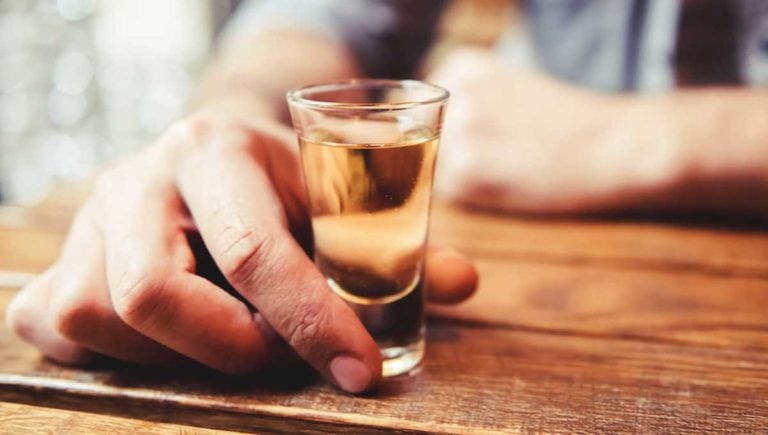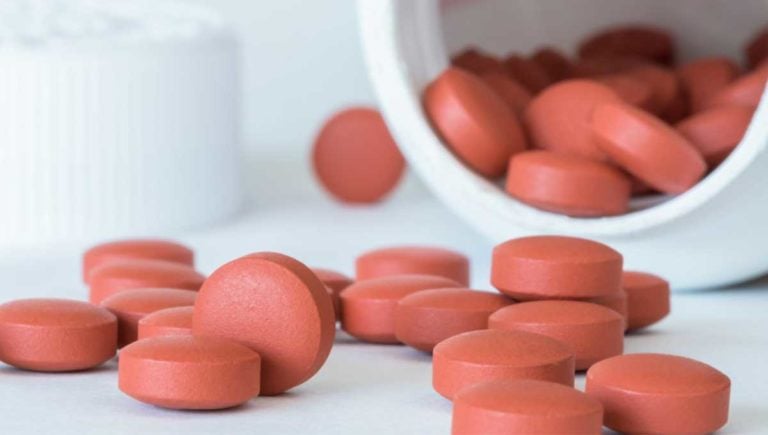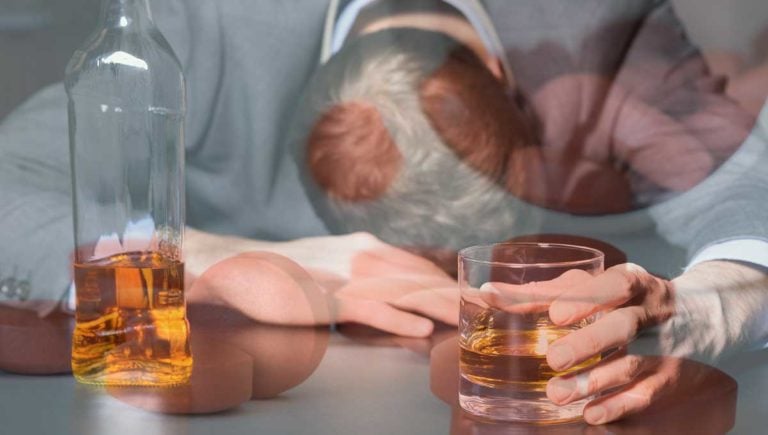Thanks to our collective pandemic stress, we are drinking more than ever. And we're also more hungover than ever.
Advil is one of the most popular ways to manage a hangover, or so we thought. Some people will take an Advil first thing in the morning after a night of drinking. Others will take one just before bed as a preventative measure.
But, while Advil is a reliable way to manage a headache, it is also a powerful medication with serious side effects.
What Alcohol Does to Your Body
When you drink alcohol, your brain releases a flood of endorphins, providing you with feelings of contentment. But there is a price to pay for those fleeting positive feelings.
The human body takes about one to three hours to process an alcoholic beverage. Here's what happens during that time.
Liver Damage
When it comes to alcohol consumption, the most vulnerable part of your body is your liver. The liver is the organ that "cleans" alcohol out of your system. 90% of consumed alcohol must pass through your liver, and your liver can only process so much alcohol at a time. The alcohol waiting in line to be processed ends up circulating in your bloodstream, which is what leads to feelings of intoxication.
Every time your liver processes alcohol, it becomes slightly damaged. If you drink regularly, your liver won't have time to heal between drinking sessions. So that damaged tissue will become scar tissue.
Scar tissue isn't able to process toxins and nutrients as healthy liver tissue can. So, every time part of your liver becomes scarred, it becomes less effective at its job. After a long period of heavy drinking, your liver can become so scarred that it isn't able to keep your body healthy anymore. When liver scarring gets to this point it is referred to as cirrhosis.
Cirrhosis isn't the only condition caused by long-term excessive drinking. You can also get alcoholic hepatitis. This form of hepatitis is signalled by jaundice, or yellowing of the white of the eyes. You may also experience extreme fatigue, nausea, loss of appetite, abdominal tenderness, and a low-grade fever.
Kidney Damage
While your liver is the most directly damaged, other parts of your body are at risk as well when drinking alcohol. Your kidneys, like your liver, help to filter toxins from your body. What isn't picked up by your liver is taken care of by the kidneys.
And just like your liver, your kidney becomes worn down by alcohol over time. Kidneys that are repeatedly hit by excessive alcohol intake are likely to develop chronic disease and may produce kidney stones.
The acidity of alcohol can cause your bladder and kidneys to become inflamed. As your kidneys lose their ability to filter out bacteria, this inflammation can become infected.
Kidneys help to regulate the level of water in your body, If these systems are disrupted, your body will become dehydrated more easily, or retain too much water, causing swelling.
Stomach Damage
Alcohol has a corrosive effect on your stomach lining. If you don't give your stomach time to heal between drinking sessions, you may develop an ulcer inside your stomach. Or your stomach lining may tear, leading to internal bleeding.
These stomach issues can be very painful. And, if they are not given time to heal, they could become a chronic problem.
Dehydration
Alcohol is a diuretic, meaning it causes your body to flush water from its system. If you aren't mindful about drinking plenty of water while you are imbibing alcohol, you will become dehydrated.
Dehydration causes headaches, which is why a hangover typically comes along with a splitting migraine. Dehydration can also cause vomiting and nausea.
Chronic dehydration can lead to kidney stones, urinary tract infections, and decreased kidney functions.
What Advil Does to Your Body
Advil is an effective and affordable pain reliever. Why wouldn't you take it to relieve the agony of a nasty hangover?
Because there are internal side effects when you take Advil or any form of ibuprofen.
Ibuprofen and Stomach Lining
In essence, ibuprofen works by suppressing the production of an enzyme that stimulates a pain response from your body. This same enzyme helps maintain your stomach lining.
When you take ibuprofen to suppress pain, you are also weakening your stomach lining. This effect lasts about six to eight hours.
If you take Advil while you drink, you are leaving your stomach unprotected from the corrosive effects of alcohol for hours at a time.
Regularly taking Advil while you drink enhances your chances of experiencing internal bleeding and stomach ulcers.
Ibuprofen and Kidneys
The same enzyme that maintains your stomach lining also supports blood flow to your kidneys. If you take ibuprofen regularly, you may be cutting off circulation to your kidneys.
Lack of blood flow can cause acute kidney damage. This leads to nausea, fatigue, swollen legs, and shortness of breath.
Acute kidney damage is reversible. But if left unchecked it can become chronic. Chronic kidney damage can cause diabetes and high blood pressure.
Ibuprofen and Your Liver
Advil isn't as hard on your liver as Tylenol. But it can cause your liver to become inflamed.
If your liver is already weakened from alcohol, this extra level of stress could multiply your issues.
Alcohol and Advil Combination
When you combine Advil and alcohol, their mutual side effects compound each other and cause more potent damage. It's important to understand the effects.
Increased Kidney Damage
Advil and alcohol also combine forces against your kidneys. First, acidic alcohol causes kidney tissue to become inflamed. Next, ibuprofen suppresses the enzymes that stimulate blood flow to the kidneys.
The lack of oxygen and nutrients from the blood, combined with inflamed tissue, is a recipe for infection and kidney failure.
Increased Stomach Damage
The Advil strips away your stomach's protective lining for up to eight hours. If you drink at any point during that time window, you are exposing your stomach to the high acidity of alcohol with no protective barrier.
This combination puts you in danger of developing stomach ulcers and internal bleeding. Stomach ulcers can be extremely painful and limit the types of food you can eat. Chronic stomach bleeding can lead to anemia.
Increased Liver Damage
As the alcohol scars your liver, ibuprofen triggers the overproduction of enzymes that put unneeded stress on the liver. This leads to an excess of toxins that are unable to be filtered from the bloodstream, and can eventually cause cirrhosis or alcoholic hepatitis.
Increased Drowsiness
In some individuals, ibuprofen can cause drowsiness. If one of these individuals were to take ibuprofen while drinking, the two substances combined can cause severe motor skill reduction or even blackouts.
How Long After Drinking Can I Take an Advil?
Your body usually finishes processing alcohol in one to three hours. At this point, your stomach at least should no longer be in danger from the acidic alcohol.
However, just because your liver and kidneys have finished processing the alcohol, that doesn't mean they have recovered yet. Processing alcohol takes a toll on sensitive organ tissues. If you take Advil right after drinking, you could still be putting extra stress on organs that have already been weakened.
It can be frustrating to lose an effective painkiller for treating hangovers, but it is better for your long-term health.
Natural Remedies for Hangovers
If reading this article just took away your favourite hangover cure, don't worry. The following list provides some all-natural options for getting rid of that nasty headache and nausea that comes after a night of hard drinking.
1. Bananas
Bananas are high in potassium, which can help your body retain more water and get rid of dehydration. Dehydration is the main component of a hangover that causes headaches.
2. Eggs
Eggs are rich in amino acids that help produce antioxidants. These antioxidants can help break down the waste produced by the digestion of alcohol.
3. Watermelon
We all know watermelon has a high H20 content, helping fight dehydration. But this fruit also contains high levels of L-citrulline, which can help improve blood flow.
4. Pickles
As any athlete knows, your body needs electrolytes to fight dehydration. Sodium is one of the most common electrolytes.
Sodium is what gives pickles their intense briney flavour. A few pickles will help restore your sodium levels.
5. Honey
Some research indicates that fructose slows the production of acetaldehydes. This is a by-product that occurs when your liver processes alcohol. Acetaldehydes cause much of the discomfort you feel when hungover
6. Crackers
Drinking can lower your blood sugar. A quick way to increase your blood sugar is to eat some crackers, which are rich in carbohydrates.
7. Nuts
Drinking alcohol depletes the magnesium in your cells. Nuts are rich in magnesium and can help reduce muscle cramps.
8. Spinach
Spinach is rich in folate, a nutrient that becomes blocked by alcohol during a night of drinking. Spinach will help replenish your folate levels.
Don't Combine Advil and Alcohol
Advil and alcohol are a dangerous combination. It may not have a noticeable effect the first few times you combine them, but over time this will lead to severe damage. When this finally catches up to you, the consequences could be sudden and severe.
There are a lot of unexpected ways to increase your life expectancy. For more lifestyle advice and tips, be sure to check out the rest of the Insurdinary blog.



